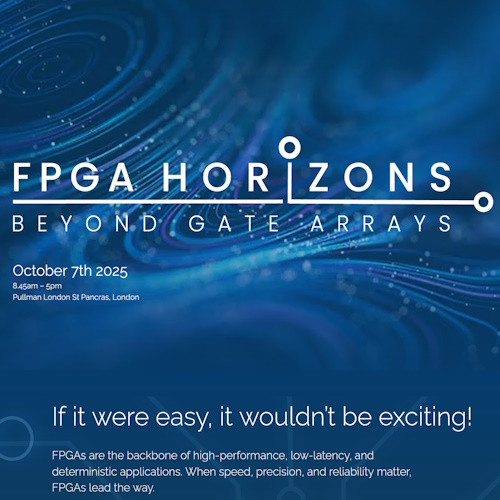If you have anything to do with the design and deployment of FPGA-based products and systems, then this is your lucky day because I’m poised to tell you about a new FPGA-centric conference and exhibition that’s heading your way. With events scheduled in both the UK and the US, this bodacious beauty will focus solely on FPGA designers and developers. No executive daydreaming, corporate fairy dust, unicorn metrics, brochureware, or “marketing poetry”—just nitty-gritty engineering know-how.
I’m starting to feel like an old fool (but where are we going to find one at this time of the day?). To be honest, it hadn’t occurred to me until recently that there are currently no FPGA-specific conferences targeted at designers and developers in the UK or the US.
Now, before you start jumping up and down exclaiming, “This is simply not the case; what about…”, let me take a moment to elucidate, explicate, and expound, as is my wont.
It’s certainly true that there are occasional vendor workshops in both the UK and the US. These events are where “purveyors of FPGAs to the aristocracy” hold user-specific workshops or developer events. However, these are typically small-scale, targeted sessions that focus solely on a vendor’s own offerings, including components and tools.
There are also a few FPGA-centric academic conferences in the US, like the ISFPGA (International Symposium on Field-Programmable Gate Arrays) and the IEEE FCCM (Field-Programmable Custom Computing Machines) Symposium. Similarly, there are university or research events in the UK where academic groups working on FPGAs or reconfigurable computing organize workshops or symposiums that are highly technical and limited in scope.
You may call me “unfair” (I’ve been called worse, and by my dear old mum at that), but I tend to think of these events as venues where brilliant minds present elegantly crafted solutions to problems that very few people working on real-world designs actually have.
What I’m interested in is FPGA designer/developer conferences and exhibitions where system architects, hardware design engineers, and software developers working in the trenches can learn how to keep real-world products from catching fire, how to meet deadlines, and how to avoid bankrupting the company.
In a crunchy nutshell, I view academic gatherings as being the place where PowerPoint slides go to defend PhD theses, while designer/developer gatherings are where napkin sketches evolve into products you can drop on your foot.
I’ve attended (and presented at) numerous engineering conferences throughout my career. Many of these have included FPGA-related tracks or exhibitors, but more as an afterthought than as a central pillar of the conference program.
Now that I come to think about it, the only purely FPGA-centric conference I’ve ever attended is the FPGA Forum. This is an annual event that’s held in Trondheim, Norway. I was lucky enough to be invited to give keynote presentations at this august gathering in 2012 and again in 2022. Suffice it to say that, for Norway and other Scandinavian countries, this is the place “to see and be seen” for practitioners of the mystic FPGA arts and purveyors of FPGAs to the haut monde.
There may be other FPGA-centric events in Europe that I’m not personally aware of. However, even if this is the case, colleagues in the UK tell me it can be challenging to convince their companies to send them to conferences in mainland Europe. Travel and accommodation costs add up quickly, the time away from projects can be hard to justify, and—since Brexit—there can also be extra administrative or logistical hurdles that make the idea less appealing to management.
I have a friend (stop laughing, it’s true!). I’m talking about Adam Taylor. We both graduated from Sheffield Hallam University (known as Sheffield Polytechnic in my day), but Adam graduated 20 years after I did. This isn’t because he’s slow. It’s because he’s 20 years younger or, as I prefer to think about it, I’m 20 years older and wiser.
There have been several FPGA gurus over the years, including Stephen Trimberger, Jonathan Rose, and André DeHon, whose groundbreaking work has helped shape FPGA architectures and tools—often from a theoretical or research-oriented perspective. At the time of this writing, however, Adam is perhaps the best known, being renowned for practical, hands-on designs targeting real-world devices. Over the years, he’s built a strong reputation as an educator and engineer focused on bridging complex FPGA technology with everyday development challenges. To date, for example, his blog, The MicroZed Chronicles, boasts more than 40 million reads.
Adam has an interesting engineering background. As I wrote in There’s More Than One Way to Become an Engineer, upon leaving university, his first job was with a defense contractor, utilizing Xilinx FPGAs as a platform to develop and implement digital signal processing (DSP) algorithms for use in radar systems.
His next position involved using FPGAs to create control systems for nuclear submarines. This is where he honed his skills in creating high-reliability, mission-critical, safety-critical, and radiation-tolerant designs.Adam also used FPGAs to implement high-speed cryptographic algorithms and high-performance image processing algorithms. All this experience stood him in good stead when he eventually transitioned into the aerospace industry and began creating FPGA-based designs for use in space applications, such as satellites and deep space probes.
In 2014, Adam founded ADIUVO Engineering and Training. Since that time, ADIUVO has built an enviable reputation for high-reliability, mission-critical, safety-critical, and radiation-tolerant designs. As a result, Adam counts all the major FPGA vendors as clients, and he spends much of his time traveling the world contracting for organizations such as NASA and the European Space Agency (ESA).
The reason I’m waffling on about all this here is that I was just chatting with Adam, who was bringing me up to date with the latest and greatest news about the forthcoming FPGA Horizons conference and exhibition, which will be held in London, England, on the 7th of October 2025.
Recognizing the need for an FPGA-focused event in the UK, Adam founded ADIUVO Events. It’s a tribute to his reputation that every major FPGA player on the planet was quickly clamoring to take part—I’m talking about FPGA vendors, distributors, IP core providers, design and test tool vendors, along with consultancies and system integrators. In fact, the response has been so intense that the ADIUVO Events organization has been turning exhibitors away, promising a bigger venue for future conferences.
In addition to the exhibits, this inaugural event boasts a collection of awesome speakers and dual tracks. All the presentations are geared toward real-world engineers wanting to solve real-world problems. One great thing, at least as far as I’m concerned, is the cost to attend. At only £100 per person, this is a fraction of the price you can end up paying for other technical events. The buzz is building. In addition to attendees from the UK, Adam tells me that people are traveling from several European and Scandinavian countries. In fact, there’s even one person who is coming all the way from New Zealand! Speaking of which, there aren’t many slots remaining, so if you’re interested in attending, you really need to register as soon as you can.
But wait, there’s more! Since the response to this UK incarnation of FPGA Horizons has been so overwhelming, ADIUVO Events is partnering with the Printed Circuit Engineering Association (PCEA) to bring FPGA Horizons to the US. The resulting FPGA Horizons US East event will take place on the 28th-29th April 2026 at the DCU Convention Center in Worcester, Massachusetts.
The “US East” portion of the moniker suggests the possibility of a “US West” counterpart, but I currently have no more details on these North American events. Having said this, if you visit the main FPGA Horizons page and scroll to the bottom, you can subscribe to the mailing list to be kept abreast of ongoing developments.
I, for one, am tremendously excited by all this. I’ve had a long relationship with FPGA space (where no one can hear you scream), and I welcome these FPGA-centric events. What say you? Do you have any thoughts you’d care to share on any of this?
Source Link







